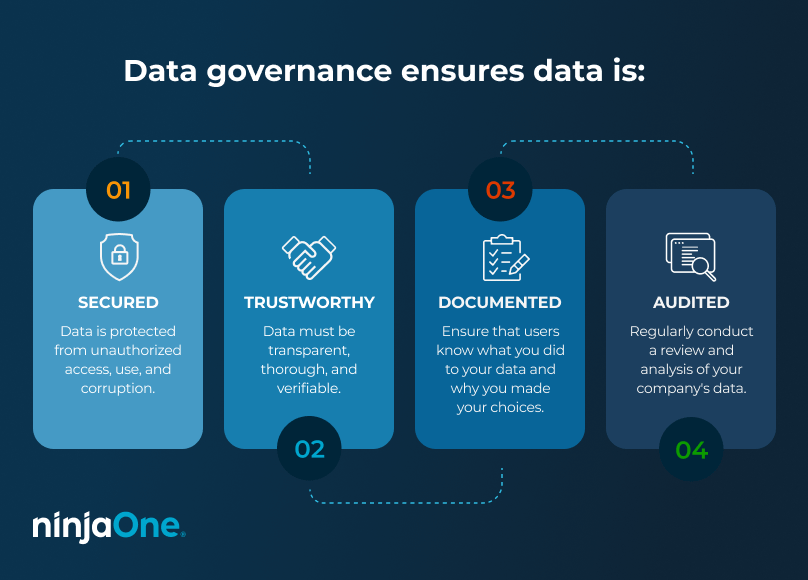Data governance refers to your organization’s approach to managing and protecting its data throughout its entire lifecycle, from acquisition to disposal. Ideally, your data governance strategy supports your data’s availability, quality, and security through various policies and standards, determining who can access data and when and what kinds of data are under governance.
As such, data governance is an umbrella term that includes data integrity and all the actions and processes end-users must take to access specific types of data. It also covers the various internal standards or data policies you’ve created that help you comply with other external standards set by industry associations and government agencies.
Why is data governance important?
Data is arguably the most important asset in any organization. You need data to make better decisions and maintain your organization’s competitive advantage.
Your company must create its own data governance plan to ensure all data is usable, accessible, and protected. A robust plan will give rise to better data analytics, leading to more efficient business processes. Additionally, it minimizes the risk of dirty data or data corruption, which may cause various organizational problems.
Benefits of data governance
Implementing an excellent data governance framework can improve the value of your data. Your stakeholders and end-users will be more confident about your decisions because they know you used high-quality and accurate data to make them. Other key benefits include:
Improved data literacy
Data governance practices can reconcile potential differences in information silos as they determine pathways for data sharing between teams. Specific users with access to cross-team data can then share their knowledge with their team members or create a centralized place for all data, such as in a data catalog. This documentation, in turn, enables consistent shared data across the organization.
Stronger data privacy and compliance
Data governance ensures your organization complies with various regulatory policies, such as the GDPR, HIPAA, and PCI DSS. The importance of remaining compliant with necessary regulations cannot be overstated: Not only do they ensure your data is protected, but noncompliance can lead to hefty fines. For example, according to the GDPR Enforcement tracker, the largest noncompliance fine (as of the time of writing) has been against Amazon for €746 million.
Interested in conducting a compliance audit?
Read this article to learn more.
Better data analytics
The natural effect of an exemplary data governance plan is high-quality data. These data promote more advanced data analytics and initiatives, leading to more targeted marketing campaigns, enhanced decision-making capabilities, and improved operational efficiency.
Greater customer trust
Data governance covers regular audits of your data points. This helps you gain the trust of your customers, who are assured that their sensitive information is always protected, leading to higher customer satisfaction, better reviews, and, ultimately, more prospects. For example, you can include your data governance plan in your MSP marketing brochures to highlight your organization’s commitment to high-quality data.

Challenges of data governance
Overall, data governance is beneficial to any organization. Nevertheless, governance plans may present a few hurdles that need to be overcome, such as:
Alignment across teams
One of the biggest challenges to data governance is aligning strategies across teams and stakeholders. During the early stages of implementation, your team may experience less efficiency and productivity.
Assigning access
It is important that your data governance plan clearly describes who has access to what information and when. Ensure that these policies are regularly updated to reduce the risk of insider threats possibly damaging your data. You may also consider hiring a data steward to enforce accountability across data teams.
Limited resources
Startups with limited resources may struggle to implement their data governance plan fully. While thinking of the “perfect” data framework is always good, it’s better to design a strategy that accounts for your current tools and existing data architecture.
NinjaOne aids data governance strategies
NinjaOne easily fits into your data governance plan with its data recovery software. In the effect of a data breach, Ninja helps you recover all your data, from documents to photos to videos. With its user-friendly interface, its data recovery software keeps your data protected—all from a single pane of glass.
If you’re ready, request a free quote, sign up for a 14-day free trial, or watch a demo.

